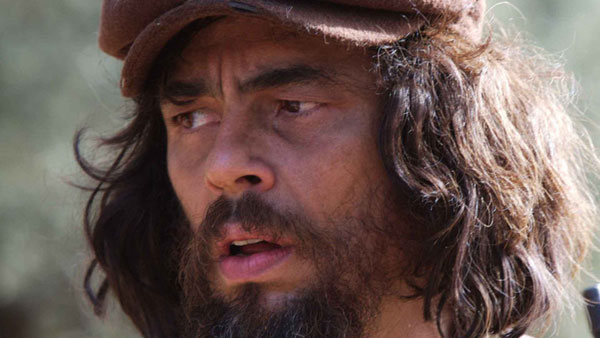Che: Part Two
Whereas Part One concentrated on Che’s early revolutionary exploits, Part Two focuses on Ernesto 'Che' Guevara’s final mission to Bolivia where he plans to bring down a cruel right-wing government.
Plot summary
In 1967, Ernesto 'Che' Guevara leads a small partisan army to fight an ill-fated revolutionary guerrilla war in Bolivia, South America.

For me Che: Part One lacked the pace and interest to make it anything more than an average film. As a result, I was inclined to believe Part Two was likely to follow a similar pattern but, instead, it offered far more exciting viewing and a fantastic dénouement.
Whereas Part One concentrated on Che’s early revolutionary exploits, Part Two focuses on Ernesto Guevara’s final mission to Bolivia where he plans to bring down a cruel right-wing government using the knowledge he had picked up whilst fighting alongside Castro in Cuba. The film begins with Che Guevara leaving Cuba in a disguise and smuggling himself over the Bolivian border. Guevara hides out in the jungle and trains a band of revolutionaries to fight for the working people of Bolivia and win, what becomes a seemingly unwinnable war. As the film develops things begin to go wrong and many of Che’s comrades fall in ambushes and battles.
The film begins in the same vein as the first part ended; it is slow and, in some places, feels a little disjointed. I believed that I was going to sit through a tedious recollection of Che’s life. However, after the first thirty minutes is out of the way, the scene is set for an hour and a half of tension and some fantastic set piece battles. Throughout all of this, Soderbergh manages to create an impending feeling of doom that grows stronger as time goes on. Although there is not much music in the film, the moments where it is used are selected so precisely and so well that, at some moments, I was struggling to remain perched on the edge of my chair.
Benicio Del Toro (Che Guevara) is another reason why this film deserves praise. His portrayal of Che is intelligent and well-acted although both Del Toro and Soderbergh clearly made an effort not to reveal too much about his deeper personality, something that many of Che’s biographers have pondered. The rest of the cast, as with the last film, worked more as an ensemble to represent the rebels rather than any particular characters or performances standing out. Although some have criticised this, it does mean that Che really is the centre of the film and that the film is true to what actually happened rather than some events being made up for the sake of a Hollywood audience, as is so often the case.
The jewel in the crown though is the ending. The last half an hour, involving a hapless final attempt by the rebels to resist capture and then the subsequent capture and final moments Che Guevara’s life, is a great piece of cinema that has one gripped and nervous about what awaits. So often films that follow real events, because the ending is known by the audience, fail to shock or move but, in this case, Soderbergh has done everything right to keep you gripped right up until his name appears on screen. Some of the camera work is unconventional but very effective and whilst this film may not be remembered for storylines or plot twists, it should be recognised as being a master class on how to create an atmosphere.
Che: Part Two certainly trumps Part One if only for being a lot more watchable. But it is more than just that. The mood created and some of the immersive techniques used make this film an experience. It is clear, at least to me, that this is the period in Che’s life that Soderbergh wanted to concentrate on most and perhaps it would have been better had he just released the second half of this contrasting series.












COMMENTS